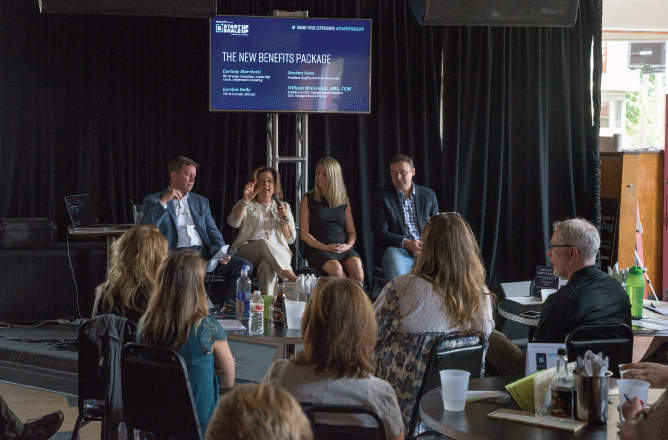Startup Scaleup Panelists Stress Link Between Benefits, Culture

Unlimited paid time off, flexible work schedules, dog-friendly offices – it’s a brave new world in the market to attract and retain top talent. Today’s employees are looking for ever more progressive benefit packages from employers with some even minimizing the importance of traditional benefits such as health care and retirement plans, according to panelists at Startup Scaleup’s “The New Benefits Package” session. Smart businesses are responding, they said, by tweaking conventional practices and policies to weave in more flexibility and, well, buy-in.
“The overall view of benefits is now, ‘What are the things that actually impact our employees and what are our touch points with our employees?’” explained Cortney Marchetti, a human resource strategist and owner of Ampersand Consulting, a company she founded six months ago after relocating to Northeast Ohio from San Francisco. “Anything that touches the employee experience can be a benefit and you can use it as an organization to help drive the kind of culture you want and help create the company you want.”Marchetti was one of four local experts sharing insights into the latest benefit trends at the panel discussion – one of 35 sessions during Startup Scaleup presented by JumpStart Inc. Moderated by William McCormick, president and CEO of session sponsor Vantage Benefit Advisors, the panel also included Gordon Daily, CEO and co-founder of live-streaming company BoxCast, and SueAnn Naso, president of Staffing Solutions Enterprises.
Marchetti, who admits she comes from “the land of crazy benefits,” cited a litany of creative ways Bay Area companies try to stand out in the fight for talent, from kitchens fully stocked with free snacks and collaborative work spaces featuring foosball tables to services that help new mothers bank and ship breast milk when traveling for work and health care benefits that help cover the cost of fertility procedures. Even company swag and other freebies can be a benefit.
“If you are a B-to-C company, you might give employees beta access or free access to your product,” she said.
Naso said other less traditional benefits she’s seen include programs to help new employees reduce their student debt load and paid time off for volunteer work. “I do (also) believe in buy-in and equity for employees,” added Daily of BoxCast. “Even if it’s not a lot, even if it’s just symbolic. That is the initial intent, to get their buy in on working for your company.”
For those who are worried unlimited time off and flexible work policies will lead to anarchy at the office, Daily said the opposite is true. When companies take away the long list of rules, stop regulating when, where and how employees do their job and instead provide clear expectations, a shared purpose and “an environment where people want to be there,” he said people actually work more.
“I would think the ‘new benefit’ is the culture, especially for a lot of the people who have maybe existed in a culture that was not always this way. It’s like a fresh drink of water in the desert. … It is amazing how people end up working more and take less vacation where there is not as stringent of a vacation policy,” Daily said.
This story originally appeared on Crain’s Cleveland Business.